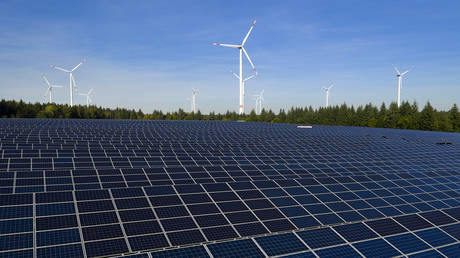Berlin’s spending on tackling skyrocketing energy costs has already topped $270 billion
Germany’s government will have to allocate more than $1 trillion by 2030 to deal with the risks and challenges that have arisen due to the energy crisis, Bloomberg reported on Sunday, citing its primary research service.
The enormous costs are expected to include investments in modernization of the country’s power grids and a planned phase-out of its nuclear and coal plants. Berlin will reportedly face growing demand from electric vehicles and heating systems. Moreover, the German authorities are obliged to meet climate commitments.
The increase in power demand by some 30% from the country’s current consumption will take to about 250 gigawatts the new capacity projected to be installed by 2030, according to data provided by the country’s network regulator and think tank Agora Energiewende, as quoted by Bloomberg.
The planned transition is also expected to require the installation of solar panels covering the equivalent of 43 soccer fields and 1,600 heat pumps every day, according to the news agency’s analysts. On top of this, the nation’s ambitious plan would need to see 27 new onshore and four offshore wind farms built per week.
Earlier this month, Brussels-based think tank Bruegel reported that EU nations had splashed out nearly €800 billion (nearly $846 billion) on support measures as the region continues to reel from climbing energy costs.
According to the analysis, €681 billion was allocated for subsidizing households and businesses to help them in covering soaring electricity costs. Germany reportedly topped Bruegel’s spending chart, having set aside nearly €270 billion, while the next three highest, UK, Italy and France, each spent around €150 billion.
For more stories on economy & finance visit RT’s business section






